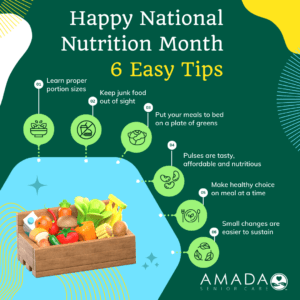The golden years can indeed shine golden, provided older adults and seniors aged 65 and older maintain a raised awareness of health and optimal living. One of the key elements to healthy living for adults aged 60 and above is good nutrition. From boosting immunity to reducing the risk of chronic disease, the benefits are limitless. National Nutrition Month encourages seniors and older adults to check their dietary plan and health regimen. Good nutrition is vital for seniors, as those age 60 and over often develop unique dietary needs. Still, it’s always recommended to check with your physician before making any drastic changes to your eating plan.
disease, the benefits are limitless. National Nutrition Month encourages seniors and older adults to check their dietary plan and health regimen. Good nutrition is vital for seniors, as those age 60 and over often develop unique dietary needs. Still, it’s always recommended to check with your physician before making any drastic changes to your eating plan.
The Undeniable Link Between Aging and Nutrition
As we age, our bodies undergo various changes in structure, function, and metabolism. Energy requirements decrease as physical activity levels and metabolic rates drop. However, the need for certain nutrients, like vitamins and minerals, increase due to decreased absorption. This conundrum creates the need for nutrient-dense meals for the elderly.
Good nutrition is not a panacea, but it plays a pivotal role in enhancing seniors’ quality of life. It supports overall health, maintains physical and cognitive functions, and reduces the risk of disease. Without proper nourishment, seniors can spiral into a cycle of poor health, leading to decreased mobility, reduced independence, and a diminished quality of life.
Unique Dietary Needs of Seniors
The dietary requirements of seniors are significantly different compared to younger adults due to physiological changes associated with aging. Here are a few reasons why:
Seniors Often Experience Reduced Appetite and Altered Taste
Aging often accompanies a reduced appetite and changes in the sense of taste and smell, which can discourage seniors from eating balanced meals. Furnishing food that is flavorful yet healthy can encourage regular meals.
Changes in the Senior Body’s Digestive System
With age, the body produces fewer digestive enzymes leading to problems like constipation and nutrient absorption. Increasing fiber intake and drinking plenty of water can help manage these issues.
Medication and Nutrient Interaction
Certain medications can affect the absorption and utilization of nutrients within the body, making additional dietary supplementation necessary.
The Importance of Key Nutrients for Seniors
Itemizing the nutritional needs of elders can bring clarity to the dietary focus. There are a few components deserving special attention.
Adequate Protein for Senior Health
Adequate protein in a senior’s diet helps to maintain muscle mass, strength, and aids in wound healing. A gradual loss of muscle mass is natural with aging, named sarcopenia, but can be offset by regular physical activity and protein intake.
Fiber Benefits the Senior Body
Fiber can significantly benefit seniors by preventing constipation and aiding in weight management. It also helps to control blood sugar levels and to reduce blood cholesterol.
Calcium and Vitamin D: Key for Bone Health
Calcium and vitamin D are two nutrients necessary for bone health. Including calcium-rich and vitamin D fortified foods is pivotal to prevent osteoporosis, a significant health issue in seniors, particularly women.
Vitamin B12 Absorption a Challenge for Senior Bodies
Elderly people often have a hard time absorbing vitamin B12 from foods. This vitamin plays a critical role in maintaining nerve function and red blood cell production. Supplementation or fortified foods may be helpful in these situations.
Practical Tips for Improved Nutrition in Seniors
Good nutrition for seniors doesn’t have to be complicated. Here’s a simplified set of tips:
- Understand how to read food labels to make the best dietary choices
- Include nutrient-dense, colorful fruits and vegetables in the diet
- Make healthy fats from avocados, fish and nuts a part of daily meals
- Hydrate regularly with water, herbal tea or fruit-infused water
- Lean toward lean protein sources like chicken, fish and legumes
- Supplement nutrients such as B12, D, and calcium, when natural intake is challenging
Quality Nutrition Fuels Graceful Aging
As seniors age gracefully, their dietary needs may shift but their requirement for quality nutrition does not. Although aging is a natural process, decisions about diet and nutrition can significantly affect how we age. Therefore, it is essential to adapt our diets as we age to cater to our unique needs, promoting a healthier and more active senior life. With balanced nutrition, the golden years can indeed shine brightly golden with energy, vitality and health.
Remember to Check with Your Health Provider
Seniors should consult first with their doctor, nutritionist or other health professional before starting a new dietary regimen or fitness program. Taking this needed step will help identify any health condition that could make a new diet or physical activity dangerous. If you’d like to learn more about having the assistance of a trained caregiver for meal preparation or exercise, please don’t hesitate to speak with an Amada Senior Care advisor. Click here to find an Amada Senior Care location near you.



